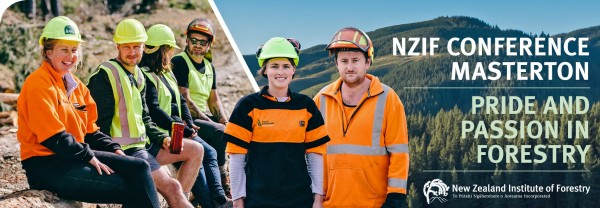8th February 2021 Newsletter
PRESIDENTS COLUMN
 I would like to wish all members a positive 2021. It is hard to forecast what this year will bring, however we must be grateful for the position we are in; especially when we look at what is happening with our colleagues overseas. I hold regular zoom meetings with NZIF equivalent professional bodies in UK, Australia, Canada, America and South Africa and I get off these calls feeling grateful I am in New Zealand. Taking a leaf out of the Governments book, which has allowed us to get to our current position, it would be great to see 2021 being the year where we all worked together as a team to help improve the climate and grow the economy of New Zealand.
I would like to wish all members a positive 2021. It is hard to forecast what this year will bring, however we must be grateful for the position we are in; especially when we look at what is happening with our colleagues overseas. I hold regular zoom meetings with NZIF equivalent professional bodies in UK, Australia, Canada, America and South Africa and I get off these calls feeling grateful I am in New Zealand. Taking a leaf out of the Governments book, which has allowed us to get to our current position, it would be great to see 2021 being the year where we all worked together as a team to help improve the climate and grow the economy of New Zealand.
I was therefore disappointed to see members of our Institute immediately state the Climate Change Commission (CCC) had got it wrong; and did not really know what they were talking about. In fact when I look at the comments from all industries; forestry seems to be the most negative. Why is this? Why do we immediately hate change? It is a fact New Zealand needs to make some serious changes to enable us to meet our commitements. It is also a fact offsetting carbon by planting trees has only ever been a stop-gap measure. Otherwise if you take it to the extreme we will need to continue planting until we have no land for anything else. All sectors need to find ways to reduce their footprint and the forest industry needs to offset the rest.
There seems to be an anti-native forest planting within our membership. Personally I can not think of anything better in much of our degraded land. Planting forests of exotic in areas we know we will never harvest does cause me concern. Yes I know radiata will fix carbon more quickly, but in the long run; 100+ years; native will fix more. Personally I like the CCC’s idea of continuing new planting of radiata for another 10 odd years and starting planting native now to cover the carbon we produce from 2050 on. Radiata planted now will in general not be helping offset emissions in 2050 so we need something which will.
In addition to this we need to bring the public along. Whilst we may disagree, there it no dispute the public do not want to see massive areas planted into radiata. We need to listen to what the public are telling us and take heed, otherwise we risk becoming the next ‘dirty dairy’. We are forest professionals; not radiata professionals. We are the group who should be supporting planting of all trees and providing advice to the government, NGO’s and public how to do this. So why do we instead tell the public the CCC’s ideas are impossible? Why do we not find solutions to the challenge the CCC is sending our way and work towards making it happen. Yes I understand planting native is difficult and expensive but it is possible. We just need to be innovative and suggest ways to make it less difficult and more economic. I know we have a Minister who is willing to listen to new (or old) ways of doing things.
So members my challenge for you this year is let’s start a conversation about how we can help New Zealand achieve its goals. Let’s be positive about what is possible and stretch ourselves to come up with innovative and sustainable ways to ensure we can do our part. Let’s be foresters in the true sense; rather than foresters of exotic plantations only.
As I have stated regularly in these columns, I want to encourage debate on any topic relevant to members. I encourage you all to write into the newsletter and start any conversation you want. Council need to understand what members are thinking and where they stand on issues to be able to represent it. The next three years will be a period of change for forestry with the Minister proposing some changes to the Forest Act, the implementation of the Forest Advisors Bill and the effects of the CCC’s. NZIF will be asked to have a view, provide advice and make recommendations. To represent you well we need to know what you are thinking. Please therefore write into members voice, give me a call or send me an email. We need your voices heard.
Hear’s to a positive and Productive 2021
Thanks
James
MEMBERS VOICE
Climate Change Commission, the effectiveness of the ETS and forest policy
The dominant climate change policy implemented by successive NZ governments has been the ETS, which has mainly been directed at using sequestration by forests that can be offset against emissions from other sources. So how effective has that been? The analysis below, based on publicly available data, is pretty simplified, but it serves to illustrate some points.
The first table is from the NZ greenhouse gas inventory report covering 1990 to 2018 (CO2 equivalent (kt)) (LULUCF removals are those from “Land Use, Land Use Change and Forests” and are essentially the carbon sequestered by forests):
|
Year |
Gross Emissions |
LULUCF removals |
Net Emissions |
Comments |
|
1990 |
63,591 |
-28,297 |
35,294 |
|
|
1991 |
64,454 |
-30,239 |
34,164 |
Minimum net |
|
1993 |
65,433 |
-30,704 |
34,729 |
Maximum removals |
|
2005 |
81,274 |
-25,329 |
55,946 |
|
|
2006 |
81,455 |
-23,304 |
58,152 |
Maximum gross |
|
2008 |
79,526 |
-29,055 |
50,470 |
Start of ETS |
|
2013 |
78,805 |
-20,116 |
58,689 |
Minimum removals Maximum net |
|
2018 |
78,862 |
-23,394 |
55,468 |
Minimum gross |
|
Change 1990-2018 |
+24% |
-17% |
+57% |
|
|
Change 2005-2018 |
-3% |
-8% |
-1% |
|
The NZ Nationally Determined Contribution (NDC) under the Paris Agreement is to reduce emissions to 30% below 2005 levels by 2030. In 2018, nett emissions were 1% below 2005, but were 57% above 1990 levels.
This table is from NEFD data for plantation forests from 1990 to 2020:
|
Date |
Plantation area (mill ha) |
Private forest area (mill ha) |
Standing Vol (mill m3) |
Average age (yrs) |
Comments |
|
1990 |
1.261 |
0.654 |
|
|
Base year for Kyoto Protocol |
|
1991 |
|
|
233.291 |
|
1st year Standing volume published, |
|
2003 |
1.827 |
1.681 |
398.000 |
13.7 |
Maximum area |
|
2008 |
1.761 |
1.634 |
445.933 |
15.2 |
Start of 1st commitment period |
|
2018 |
1.704 |
1.642 |
482.511 |
17.6 |
|
|
2020 |
1.665 |
1.540 |
501.116 |
18.3 |
Current |
|
Change 2008-2020 |
-5% |
-6% |
+12% |
|
|
I started with 1990 data, which is the base year for commitments under the Kyoto Protocol. I have also included 2008, the start of the first commitment period under the Protocol. There was a substantial shift in the balance of State- and privately-owned forest in NZ, following the sales of State Forests in 1990 and subsequently.
The maximum area of NZ exotic plantation forest since 1921 (1.827 million ha) was reached in 2003. By then some details of the ETS, that was to begin in 2008, were known and a decline in area began as forest owners sought to exit plantation ownership to avoid the potential liabilities under the ETS. The decline has continued through to 2020 when it stood at 1.665 million ha, a reduction of 162,000 ha or 9%. In the same time the estimated standing volume has increased by 103 million m3 or 26%. Some of this will be due to removal of poor stands and better plantation management. The increase of 4.6 years in average age (from 13.7 to 18.3) will also been a factor.
In terms of carbon sequestration, it appears that new land planting is not high (7,000 ha in 2018, compared with nearly 100,000/year in the early 1990s) and the average age of the crop is increasing. A forest can only sequester carbon once, and then carbon lost on harvest has to be replaced and grow to maturity to get back to the same carbon store. In the 5 years 1990-94, forest sequestration averaged 30,000 kt/year but from 2014 2018 the average was down to 23,000 kt/year. The contribution of forests to climate change mitigation is declining and is likely to decline further in future.
My conclusion from the above is the ETS has not proved to be particularly helpful in reducing NZ nett emissions. If we also take into account the likely higher level of emissions (due to different land use) from a significant proportion of the 162,000ha reduction in forest since 2003, any positive impact of the ETS is further reduced.
Some of you will be aware, I have always felt that the ETS as a way of increasing GHG removals was not good policy. The above brief analysis seems to support that argument. I have always believed that NZ should be focussing on reducing emissions, rather than relying on using carbon sequestration by forests to offset emissions from other sources. Use of forests has often been promoted as buying time while processes to reduce emissions were put in place. After 30 years during which emissions have increased without any real attempt to reduce them, the argument seems a bit spurious. It demonstrates a wasted opportunity to initiate action to actually reduce rather than just offset NZ’s emissions.
Consequently, I was pleased to see the proposals in the Climate Commissions draft report. While the contribution from forests is still there, it is a broader inclusion than current policy. While carbon is one element, it also factors in other benefits of forests (biodiversity, water quality, soil erosion, timber, bioenergy etc.). In this sense it echoes aspects of the New Zealand Forest Policy launched at the 2018 NZIF Conference in Nelson (https://www.nzif.org.nz/assets/Uploads/Documents/New-Zealand-Forest-Policy-28-June-18.pdf).
For those NZIF members who may be concerned about an emphasis on native forest rather than pine forest, it is worth reflecting on the issues with production forest that have featured in media in recent years (safety, log trucks, log exports, impacts of harvesting, rural depopulation, wilding conifers, hillsides covered in radiata, etc.). While some of the concerns may be based on misunderstandings and lack of knowledge, they do represent significant public opposition to plantation forests. Those with longer memories will remember intense public opposition during the 1970s and 80s to establishment of large areas of plantation forest, often replacing cut-over native forest. That opposition led to the demise of the NZ Forest Service in 1987.
What we need to do with the direction the Commission is heading, is to promote good forestry, not for climate change purposes, but for all the good things, including climate change mitigation, that forests contribute. This would include concentrating plantations on land where they grow well, are easy to harvest and where there is good infrastructure (all of which assist profitability). In addition, we should support growing and harvesting other species (particularly native species) and policy that enables less productive and erosion prone land to be retired from production and allowed to revert to native vegetation. These measures are in the Commission’s report and in the Forest Policy. Importantly, they are also more likely to have public support.
Andrew McEwen
NZIF Registered Forester, Waikanae
____________________________________________________________________________________________
The dire need for an effective long-term government National Forest Policy
Andrew McEwen’s newsletter article highlights the shocking consequences of the lack of good long-term policies for forestry which can be attributed to successive governments over the last 40 years. Our political environment is dominated by the imperatives dictated by electing a new government every three years. Too often this results in uncoordinated, issues-driven, short-term policies which inevitably lead to poor outcomes, such as the effect of the ETS on forestry.
Andrew noted that a model example of a long-term New Zealand Forest Policy was launched at a forestry conference in 2018. The reason that this was produced was to try and encourage Government to take a longer-term view. There has been no sign that the first Ardern Government was inclined to take notice and begin a serious initiative to start work in that direction. Work did start towards a medium term forest strategy but this was “putting the cart before the horse”. I will be most interested to see if the second term administration can perform any better.
Regards
Nigel Williams
____________________________________________________________________________________________
Have your say!
Ideas, thoughts or advice?? Send it through to admin@nzif.org.nz

INSTITUTE UPDATE
From the Registrar
SUCCESSFUL APPLICATION FOR REGISTERED MEMBER
The following Member is now a Registered Member:
- Grant Rowe of Mangawhai
SUCCESSFUL 5 YEAR REGISTRATION REVIEW
Continuing Registration:
- Mr Brian Rawley of Tokoroa
- Mr Paul Molloy of Wanaka
APPLICATION FOR REGISTERED MEMBER STATUS
The following Member has applied to become a Registered Member:
- Garry Townley of Russell
- Barry Murphy of Rotorua
- Pete Watt of Pukekohe
Any member of the NZIF has the right to object to an application. Any objection should be lodged with the Registrar registrar@nzif.org.nz within 20 working days of the first appearance (8 February 2021) of the notice in this newsletter, specifying the grounds for the objection.
REGISTRATION REVIEWS 2021
The following members are due for 5-year review of their status as a Registered Member during 2021;
- Hamish Marshall
- John Galbraith
- Brian McKinlay
- Paul Jensen
- Rosa Rivas Palmer
- Kit Richards
- Brian Rust
- Paul Bradbury
- David Crawley
- Ross Wade
- Bert Hughes
- Graham West
Please make a start on the review procedure by filling out the online form and submitting it early in the year so that everyone’s review gets completed before December 2021.
Any member of the NZIF has the right to object to an application for review. Any objection should be lodged with the Registrar registrar@nzif.org.nz within 20 working days of the first appearance (8 February 2021) of the notice in this newsletter, specifying the grounds for the objection.
USE OF NZIF WEBSITE FOR APPLICATIONS, ANNUAL DECLARATIONS AND CPD.
All applications for 5-year Reviews and New Applications for Registered Member status should be made using the online facility on the NZIF website (must be logged in and go to the “Members Only” section). Note that if you do not have time to complete the application in one session there is a “Save” facility that allows you to come back and complete it before submitting.
The annual declaration for Code of Ethics/Professional Indemnity/Real Estate experience can now be entered online. Go to your Profile and click on APC (Annual Practising Certificate) and populate the boxes appropriately. All RM’s need to use the online entry from now on.
CPD – is still entered online but is Submitted only once each year, as at the end of December. Saving your CPD is not the same as Submitting it. Once it has been Submitted you cannot edit it but if something goes awry please get in touch and we will get Admin to assist. The CSV upload facility is available for bulk data and if you require this please get in touch.
Alan Bell, Registrar
NZIF Registration Board
registrar@nzif.org.nz
____________________________________________________________________________________________
Registration Board Member
David Bunting

David was appointed as the independent member of the Registration Board in 2015. He is a civil engineering graduate from Canterbury University, a Fellow of the Institution of Professional Engineers New Zealand and has been a board member of the Institution of Professional Engineers, the Engineers Registration Board and the Chartered Professional Engineers Council. He is currently employed as an Environment Commissioner with the Environment Court. Prior to this, he worked in senior roles for a large firm of consulting engineers, architects and planners. He has worked on physical infrastructure projects in New Zealand, Australia, the UK and in many developing countries in the Asia Pacific region
____________________________________________________________________________________________
Call for Nominations of new Fellows
To nominate a new Fellow by 3rd May, please Read more and fill in the form
____________________________________________________________________________________________
FORESTRY EVENTS
NZIF 2021 Conference

27th to 29th June 2021
Copthorne Hotel & Resort Solway Park
High Street
Masterton
We are excited to be presenting a varied and inspiring lineup for our next conference to be held in Masterton in the mighty Wairarapa. We all know how passionate our sector work force is about what we do, and we are seeking to showcase some of this pride with our lineup of speakers and CPD sessions.
____________________________________________________________________________________________
Overseas Investment Office presentation
Save the date........
A presentation on 'how it relates to investment in forestry'.
Wednesday 21 April 2021, Hawkes Bay
further details to follow.
FORESTRY NEWS
Climate Change commission
This report stands on the shoulders of many before us who have provided evidence and warnings
about the impact of human created greenhouse gas emissions on our climate. It also recognises the
people who have developed the tools we need to change our path. I want to acknowledge their work
and express appreciation.
____________________________________________________________________________________________
Scion fire research presentations
Members of the Scion rural fire research team recently gave several presentations as part of Fire and Emergency New Zealand’s Fire Risk Management continuing professional development online seminar series.
____________________________________________________________________________________________
Royal Society Newsletter
Royal Society Te Apārangi | Issue #1123
____________________________________________________________________________________________
NZIF Administrator
Email: NZIF Office
Mobile: +64 22 653 3750
NZIF Registration Board
Email: Registrations
Mobile: +64 27 463 1118
Complaints
Email: Complaints
Appeals
Email: Appeals
© All rights reserved. No part of this site may be reproduced, adapted, or distributed without prior written permission
We are a forum to exchange ideas, opinions and information about forestry.
We encourage and help our members attain and maintain the highest standards of their profession.




